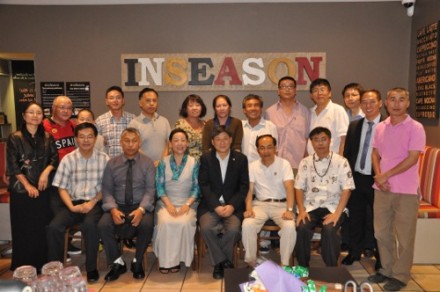 DHARAMSHALA: Kalon Dicki Chhoyang of the Department of Information and International Relations (DIIR), currently on an official trip to Australia, participated in an outreach program with overseas Chinese in Melbourne and Sydney on 28 and 29 January respectively.
DHARAMSHALA: Kalon Dicki Chhoyang of the Department of Information and International Relations (DIIR), currently on an official trip to Australia, participated in an outreach program with overseas Chinese in Melbourne and Sydney on 28 and 29 January respectively.
The outreach program was organised by the local Chinese-Tibetan Friendship associations of Melbourne and Sydney.
Kalon Dicki Chhoyang met members of the Chinese community in Melbourne on 28 January. She discussed the current critical situation inside Tibet and explained how the Chinese public can help assuage the sufferings of the Tibetan people inside Tibet.
She was invited for a dinner reception hosted in her honour by the members of the Chinese-Tibetan Friendship Association (Sydney) on 29 January. The dinner reception was attended by Chinese professors, writers, intellectuals and Chinese democratic activists. Dagpo Sonam Norbu, representative of His Holiness the Dalai Lama in Australia, Ms. Dadon, Chinese Liaison officer at the office of Tibet, Australia and heads of various Tibetan associations attended the dinner reception.
Kalon Dicki Chhoyang spoke at the dinner reception about the devolution of political authority by His Holiness the Dalai Lama to a democratically elected Tibetan leadership in 2011 and the non-violent struggle of the Tibetan people.
“The 14th Kashag of the Central Tibetan Administration led by Sikyong Dr Lobsang Sangay has steadfastly stuck to non-violence to resolve the Tibet issue through the Middle Way Approach,” she said.
Speaking about the need to create more awareness about the situation inside Tibet, she said we should reach out more to the Chinese public to make them aware of the genuine sufferings of the Tibetan people. It’s also important to strengthen the reconciliation efforts between the Tibetan and Chinese public for a peaceful co-existence. She also called for the need to safeguard Tibet’s language, religion, culture and environment from rapid degradation.
She thanked the Chinese intellectuals and democratic activists for their support on the issue of Tibet and urged them to continue their support by informing their fellow Chinese about the urgent situation inside Tibet.
Kalon Dicki Chhoyang reiterated that the Central Tibetan Administration doesn’t seek independence but a resolution to the issue of Tibet, through what we call genuine autonomy or the Middle Way Approach, within the framework of China’s constitution.
She remarked that the Middle Way Approach is a mutually beneficial solution that will resolve the Tibet issue amicably and safeguard Tibet’s rich cultural heritage from degradation.
Following her address, she answered questions and doubts posed by the Chinese audience. The Office of Tibet distributed pamphlets and booklets on the Middle Way Approach written in Chinese language to the Chinese community members.
